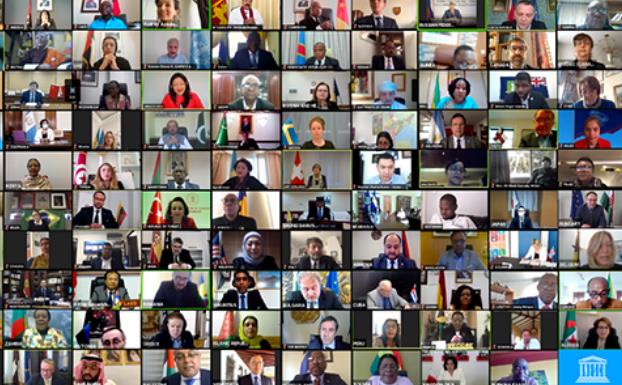Over 130 Ministers and Vice-Ministers of Culture recently joined an online meeting on 29 April, convened by UNESCO and focused on actions to bolster the cultural sector due to the unprecedented upheaval of the COVID-19 pandemic.
Their actions marked a commitment to intergovernmental dialogue and international solidarity in order to strengthen and unify their efforts.
Opening the debate, the Director-General of UNESCO, Audrey Azoulay said: ‘We must assess the impact of the crisis, launch a joint reflection and coordinated initiatives. UNESCO fully intends to play its role in this process, in line with its mandate.’
The Ministers agreed that the ‘mobility restrictions and containment measures that governments have been forced to adopt due to the pandemic have drastically curbed access to culture in the short term and – if action is not taken – could weaken the entire cultural ecosystem for generations to come.’
The ripple effect of COVID-19 on culture GLOBALLY
A large majority of participants reported that, to date, 90% of countries have closed or partially closed their UNESCO World Heritage sites and 128 countries have closed their cultural institutions.
The widespread consensus was that artists and creative professionals have been among the hardest hit by this crisis.
The closures of World Heritage sites and cultural institutions, and the ripple effect this is having within the Ministers’ respective countries, has been further compounded by the cancellation of traditional festivals and other cultural events, impacting the cultural life of communities and the income of creative professionals, whose work is often seasonal.
The Ministers reported the knock on effect for tourism is dire – for some counties, this financial loss corresponds to more than half of the country’s economic activity.
Ministers share message that Culture is vital to the solution
A succession of Ministers paid tribute to their nations’ artists and cultural sector workers, including heritage site managers, for their role in ensuring access to culture in these times of confinement through virtual programming. Many initiatives are also ensuring the continuity of arts education activities.
For a great number of governments, the expansion of digital technologies will be a major part of the strategy moving forward. The United Arab Emirates noted: ‘We must begin discussions on a holistic digital cultural economy and plan to support culture that does not easily translate in the virtual world.’
In those parts of the world that lack the relevant infrastructure to disseminate culture digitally, cooperation with television stations, radio and the press are ensuring that people can connect with culture as a source of comfort, wellbeing and togetherness during these traumatic times, the UNESCO statement said.
Building a broad coalition to support the cultural ecosystem
The massive participation in the meeting itself – some 130+ Ministers connected via video conference – was a testament to the need for international solidarity at this time, said UNESCO.
While several Ministers called for a strengthened platform for dialogue to share good practices, others highlighted the need for international financial mechanisms to support those countries least able to reinforce their cultural sectors.
The Czech Republic stated clearly: ‘Culture is an essential part of society, it is not a luxury.’
Many Ministers noted that the world will look different after the lifting of the pandemic restrictions and measures.
UNESCO reported that Sweden implored fellow Ministers in the global hook-up to ‘join our efforts to defend open and democratic societies where creators can work under free, fair and safe conditions and where artistic freedom is protected and promoted.’
The representative of Mali added that ‘this crisis is an opportunity to develop a global and strategic reflection on culture,’ while Mexico simply stated, ‘culture has always saved us in the past and this time will not be any different.’
It appeared to be a commonality among global Ministers that while the cultural sector has been one of the first to be affected by this crisis, it is often the last to receive budgetary support. Some Ministers reported on the emergency funding packages that they have put in place in their countries to safeguard the livelihoods of artists, artisans and creative professionals in the short term.
Closing the debate, the Assistant Director-General for Culture, Ernesto Ottone concluded: ‘UNESCO will continue to support you. We cannot reverse the progress seen over the past few years in the cultural sector. It’s through culture that we will forge our collective resilience and it is culture that will bring us closer together.’
This story was originally reported by UNESCO. For more information, visit en.unesco.org





